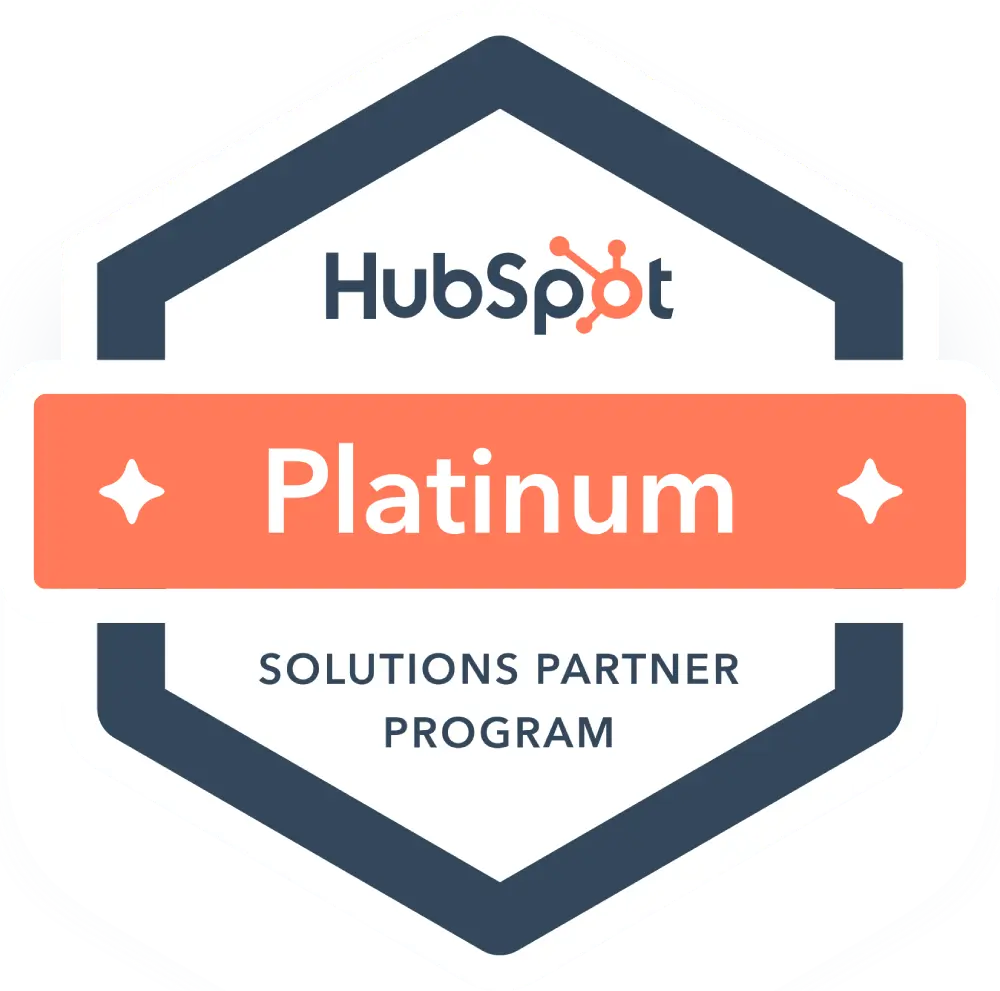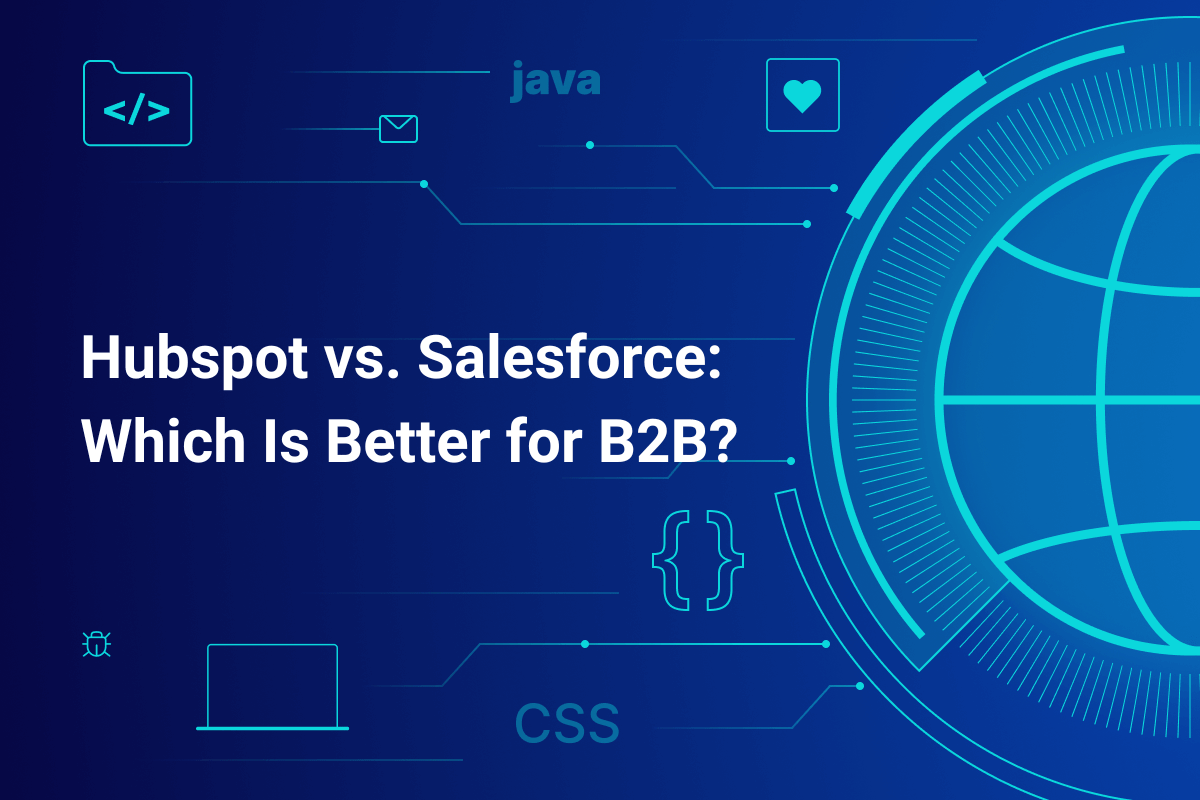Building strong customer relationships is critical to success in the B2B world. That’s where CRM, sales, and marketing tools come in. These solutions help businesses connect with customers, manage leads, and boost sales. But with so many options to choose from, it can be challenging to decide which is right for your company.
Two names that often top the list are HubSpot and Salesforce. Both platforms offer many features to support your business, and they each have a dedicated following. HubSpot boasts over 216,000 customers in more than 135 countries, while Salesforce serves 150,000+ companies across various industries worldwide.
The question is, which platform is the better choice for your B2B needs? In this post, we’ll dive deep into the features, capabilities, and pricing of HubSpot and Salesforce. The two platforms will go head-to-head, and by the end, you’ll clearly understand which is best for your business goals and budget.
Overview of HubSpot
HubSpot has earned its reputation as a versatile, powerful platform catering to the diverse needs of B2B businesses. At its core, HubSpot offers a robust CRM as a central hub for all your customer data. It enables you to track interactions, manage leads, and gain valuable insights into your audience.
But HubSpot goes beyond CRM with its comprehensive software suite, which include marketing automation, sales enablement, customer service, and lead generation tools. With HubSpot, you can create engaging email campaigns, build conversion-oriented landing pages, and personalize your outreach at scale. Its intuitive interface and design make it accessible to all sizes of B2B teams, from startups to enterprise-level organizations.
One of HubSpot’s key strengths in B2B marketing is its inbound methodology. This approach focuses on attracting, engaging, and delighting customers through valuable content and personalized experiences. HubSpot’s tools are specifically designed to support this methodology, helping you build trust and credibility with your target audience.
Overview of Salesforce
Salesforce is known for its robust and highly customizable platform that provides solutions for various business needs. Salesforce’s core offering is a comprehensive CRM that enables you to manage customer data, gain valuable insights, and track interactions.
Like HubSpot, Salesforce is also more than just a CRM. It provides a vast ecosystem of cloud-based applications that span sales, service, marketing, and analytics. With Salesforce, you can automate complex sales processes, deliver personalized customer experiences, and analyze data to make informed decisions. The platform’s extensive customization options allow you to tailor it to your specific business requirements.
One of Salesforce’s key strengths in B2B marketing is its ability to handle complex sales cycles and large-scale operations. The platform’s scalability and integration capabilities make it popular for enterprise-level organizations with intricate marketing and sales processes.
HubSpot vs. Salesforce: Feature Comparison
To help you understand the key differences between HubSpot and Salesforce, let’s take a closer look at how they stack up across various features:
| Feature | HubSpot | Salesforce |
| Ease of Use | User-friendly interface, intuitive design, easy to learn and navigate | Can be complex, steeper learning curve, requires more technical expertise |
| Integrations | Wide range of native integrations, extensive app marketplace | Extensive integration capabilities, vast app marketplace |
| Pricing | Offers a freemium model and various paid plans to suit different budgets | Generally more expensive, with pricing based on user tiers and features |
| Customization | Customizable templates, workflows, and reports | Highly customizable, but requires more technical expertise |
| Customer Support | Extensive knowledge base, community forums, and various support options | Comprehensive support resources, but can have slower response times |
| Scalability | Scales well for growing businesses, also offers enterprise-level solutions | Highly scalable, ideal for large enterprises with complex needs |
HubSpot vs. Salesforce: Sales, Marketing, and CRM Capabilities
To gain a deeper understanding of which platform is best suited for your B2B needs, we’ll compare and contrast the specific capabilities offered by both HubSpot and Salesforce across CRM, sales, and marketing:
CRM Capabilities
- Contact Management: Both platforms excel at organizing and storing customer data. HubSpot offers a streamlined and intuitive interface, while Salesforce provides more extensive customization options.
- Customer Segmentation: You can segment your audience based on criteria like demographics, behavior, and engagement in HubSpot and Salesforce. HubSpot’s segmentation tools are known for their ease of use, while Salesforce offers more advanced segmentation capabilities for complex data analysis.
- Workflow Automation: HubSpot and Salesforce both provide robust workflow automation features. HubSpot’s visual workflow builder simplifies the process, while Salesforce’s automation capabilities are more extensive, allowing for complex logic and triggers.
Sales Capabilities
- Lead Generation and Management Tools: HubSpot’s inbound marketing features, such as landing pages and forms, seamlessly integrate with its CRM. Salesforce offers a wider range of lead scoring and nurturing tools for complex sales cycles.
- Sales Automation: HubSpot’s sales tools are known for their ease of use and integration with marketing efforts. Salesforce’s sales automation capabilities are more extensive, with advanced features like opportunity management and sales forecasting.
- Reporting and Analytics: Tracking sales performance with robust analytics and reporting are key features of each platform. HubSpot’s reports are user-friendly and visually appealing, while Salesforce offers more in-depth analytics for complex data analysis.
Marketing Capabilities
- Email Marketing: Both platforms offer comprehensive email marketing tools. HubSpot’s features are known for their ease of use and integration with other marketing tools. Salesforce’s capabilities are more extensive, with advanced features like dynamic content and A/B testing.
- Social Media Management: HubSpot’s social media tools are integrated with its CRM, allowing you to track social media engagement and tie it to your overall marketing efforts. Salesforce’s social media tools offer more advanced features like social listening and social advertising.
- Content Management: Offered by both platforms, HubSpot’s content management system (CMS) is user-friendly and optimized for inbound marketing. On the other hand, Salesforce’s CMS is more powerful and customizable, making it suitable for complex content management needs.
- Marketing Automation: HubSpot’s marketing automation tools are known for their ease of use and focus on lead nurturing. Salesforce has deeper marketing automation features, with advanced features like lead scoring and predictive analytics.
HubSpot vs. Salesforce: B2B Pros and Cons
Now that we’ve explored their capabilities, let’s weigh the pros and cons of HubSpot and Salesforce for B2B.
Salesforce: Pros and Cons
- Pros:
- It’s highly customizable and scalable, and ideal for large enterprises with complex needs.
- Extensive ecosystem of applications and integrations, offering a comprehensive solution for various business functions
- Robust reporting and analytics capabilities for in-depth data analysis
- Advanced features for lead scoring, opportunity management, and sales forecasting
- Cons:
- It can be complex and overwhelming for smaller businesses or teams with limited technical resources.
- It has a steeper learning curve than HubSpot, often requiring additional training and onboarding.
- Generally more expensive, with pricing based on user tiers and features.
- Usually will require management services costs in addition to the SaaS subscription.
HubSpot: Pros and Cons
- Pros:
- User-friendly interface and intuitive design are easy to learn and navigate
- Many valuable integrations and an extensive app marketplace for seamless connectivity with other tools
- Affordable pricing options, including a free tier and various paid plans to suit different budgets
- Strong focus on inbound marketing and lead nurturing, aligning with B2B marketing best practices
- Extensive knowledge base, community forums, and support options for readily available assistance
- Hubspot managed services tends to require less billable hours to solve the same issue
- Cons:
- Customization options may be more limited than Salesforce, especially for highly complex workflows.
- Reporting and analytics features may not be as in-depth as Salesforce’s advanced analytics tools.
Why HubSpot is the Best Choice for B2B
In the battle of HubSpot vs. Salesforce, both platforms demonstrate undeniable strengths in the B2B realm. However, for startups and businesses seeking a user-friendly, affordable, and comprehensive solution, HubSpot emerges as the clear winner.
While Salesforce boasts powerful customization and scalability for enterprise-level organizations, HubSpot’s intuitive interface, extensive integrations, and focus on inbound marketing make it a more accessible and effective choice for many B2B companies.
HubSpot’s all-in-one platform streamlines your sales, marketing, and customer service efforts, allowing you to focus on what truly matters—growing your business.
HubSpot’s Advantages for Startups
For startups and smaller B2B companies, HubSpot’s affordability, ease of use, and inbound marketing focus make it a compelling choice.
The platform’s streamlined interface allows teams to get up and running fast without requiring extensive technical expertise. HubSpot’s tools for startups also eliminates the need to piece together multiple solutions, saving valuable time and resources.
HubSpot’s inbound marketing methodology fits perfectly with the needs of startups looking to build brand awareness and attract qualified leads. By focusing on creating valuable content and personalized experiences, HubSpot empowers startups to establish a strong online presence and nurture relationships with potential customers.
Leverage HubSpot for Maximum Impact with mvpGrow
If you’re a startup or B2B company looking to harness the power of HubSpot, mvpGrow is a HubSpot Platinum Solutions Partner that deeply understands the platform and can help you optimize your marketing strategies for maximum impact.
mvpGrow has a proven track record of helping businesses achieve remarkable results with HubSpot’s features, such as:
- CRM Implementation – Helping you set up and customize HubSpot’s CRM to align with your unique business processes and goals.
- Sales Enablement – Developing sales strategies, creating compelling content, and training your sales team to use HubSpot effectively
- Inbound Marketing – Creating and executing campaigns that attract, engage, and delight your target audience.
- Marketing Automation – Designing and implementing automated workflows to nurture leads, personalize customer journeys, and drive conversions.
Whether you’re just starting with HubSpot or looking to take your campaigns to the next level, mvpGrow’s expert team can provide the guidance and support you need to succeed.
Contact mvpGrow today to discover how we can help you leverage HubSpot to generate more leads and boost sales.

The Founder & Chief Getting Sh%T Done Officer of mvpGrow. After about 8 years as a hired hand some of the largest (and smallest) B2B SaaS companies worldwide I decided to hang up my employee slippers and lace up my growth agency cleats. But just because I’m an agency doesn’t mean we can’t chat (no charge). Please email me on any topic and I will gladly reply: eyal@mvpgrow.com

